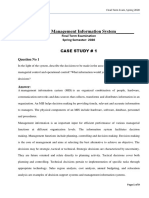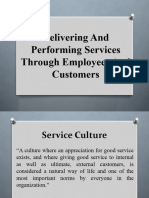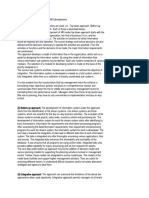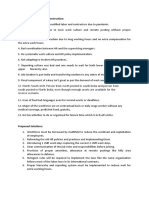0 ratings0% found this document useful (0 votes)
776 viewsARJUN E S. HR Case Study Assignment
ARJUN E S. HR Case Study Assignment
Uploaded by
Arjun SukumaranMr. Khanna insisted on employing role playing and sensitivity training as techniques for the executive development program at Punjab Bank Ltd. Role playing allows participants to act out real-life situations and receive feedback to improve their skills, while sensitivity training makes people more aware of their own biases and more sensitive to others. Both techniques provide hands-on experience and allow assessment of decision-making abilities and weaknesses. Mr. Khanna formed this opinion because role playing and sensitivity training are proven methods for improving employee performance and communication within an organization. These techniques seem suitable for Punjab Bank's program given the organization's issues with delayed decision making and lack of communication between departments.
Copyright:
© All Rights Reserved
Available Formats
Download as DOCX, PDF, TXT or read online from Scribd
ARJUN E S. HR Case Study Assignment
ARJUN E S. HR Case Study Assignment
Uploaded by
Arjun Sukumaran0 ratings0% found this document useful (0 votes)
776 views2 pagesMr. Khanna insisted on employing role playing and sensitivity training as techniques for the executive development program at Punjab Bank Ltd. Role playing allows participants to act out real-life situations and receive feedback to improve their skills, while sensitivity training makes people more aware of their own biases and more sensitive to others. Both techniques provide hands-on experience and allow assessment of decision-making abilities and weaknesses. Mr. Khanna formed this opinion because role playing and sensitivity training are proven methods for improving employee performance and communication within an organization. These techniques seem suitable for Punjab Bank's program given the organization's issues with delayed decision making and lack of communication between departments.
Original Title
ARJUN E S. HR case study assignment
Copyright
© © All Rights Reserved
Available Formats
DOCX, PDF, TXT or read online from Scribd
Share this document
Did you find this document useful?
Is this content inappropriate?
Mr. Khanna insisted on employing role playing and sensitivity training as techniques for the executive development program at Punjab Bank Ltd. Role playing allows participants to act out real-life situations and receive feedback to improve their skills, while sensitivity training makes people more aware of their own biases and more sensitive to others. Both techniques provide hands-on experience and allow assessment of decision-making abilities and weaknesses. Mr. Khanna formed this opinion because role playing and sensitivity training are proven methods for improving employee performance and communication within an organization. These techniques seem suitable for Punjab Bank's program given the organization's issues with delayed decision making and lack of communication between departments.
Copyright:
© All Rights Reserved
Available Formats
Download as DOCX, PDF, TXT or read online from Scribd
Download as docx, pdf, or txt
0 ratings0% found this document useful (0 votes)
776 views2 pagesARJUN E S. HR Case Study Assignment
ARJUN E S. HR Case Study Assignment
Uploaded by
Arjun SukumaranMr. Khanna insisted on employing role playing and sensitivity training as techniques for the executive development program at Punjab Bank Ltd. Role playing allows participants to act out real-life situations and receive feedback to improve their skills, while sensitivity training makes people more aware of their own biases and more sensitive to others. Both techniques provide hands-on experience and allow assessment of decision-making abilities and weaknesses. Mr. Khanna formed this opinion because role playing and sensitivity training are proven methods for improving employee performance and communication within an organization. These techniques seem suitable for Punjab Bank's program given the organization's issues with delayed decision making and lack of communication between departments.
Copyright:
© All Rights Reserved
Available Formats
Download as DOCX, PDF, TXT or read online from Scribd
Download as docx, pdf, or txt
You are on page 1of 2
1. Do you find any justification in the argument of Mr. Khanna?
The main reason why Mr Khanna insisted on employing role playing as a
training tactic because Role playing is an active learning technique in which
employees act out situations under the guidance of a trainer. In each
scenario, employees take on a role and act out the scene as though it were
real.
Advantages of role playing:
1. Its Social and Communal Role playing is a social activity. Players
interact within the scenarios they’re given, which encourages individuals
to come together to find solutions and to get to know how their
colleagues think. Because role play training sessions have this communal
atmosphere, it’s not only the trainer who can give feedback. Employees
can study how their colleagues perform and provide tips or take notes.
2. Prepares for Real Life
In some cases, role playing can prepare groups for scenarios that occur
in real life. Not only does this exercise offer staff a glimpse of the
situations they may encounter, but participants also receive feedback on
how they’ve performed.
3. Indicates Current Skill Level
When an individual participates in a role-playing scenario, she is
demonstrating the way that she would actually handle a similar situation
in real life. Trainers can work with individuals on their particular
weaknesses.
4. Role playing can be used as a behavioural pre-training assessment or
diagnostic to assess where a learner is in terms of skills, since the trainer
can observe real behaviour.
5. Role playing also allows assessment of how well learner understands
and can apply what is learned, as indicated in their behaviour.
Sensitivity training on the other hand is a form of training with the goal of
making people more aware of their own goals as well as their prejudices, and
more sensitive to others and to the dynamics of group interaction. It is called
laboratory training as it is conducted by creating an experimental laboratory
situation in which employees are brought together, in groups, to interact in an
unstructured environment. The members are encouraged to interact with new
members and new individual behaviours.
Because of these advantages if implemented, roleplaying and sensitivity
training can be used as an effective tool in training the employees better,
which in turn can greatly improve the performance of the organization in
general
2. Why did Mr. Khanna form such an opinion?
The main reason for Mr Khanna to form this opinion is because of the
advantages of sensitivity analysis and roleplaying, both are proven method in
training the employees in better decision making an improving their overall
performance. These two methods give them a direct approach in finding their
strengths and weakness and also a first person view about how to tackle
various issues that may arise in the organisation an how to solve them.
3. What do you feel about the suitability of technique for the executive
development programme, in this case?
The findings of all the commissions show that the main issue with the
organization is the delay in the decision making. This shows the lack of proper
communication between the various department and hierarchy of the
organization.
With the implementation of role playing and sensitivity analysis, these issues
can be greatly improved. Because role plays can be involving, both in
emotional and cognitive ways, they can also be used to help people
understand others, and the positions of others.
Sensitivity training develops the communication skills of the employers and
develops them as good listeners. It also helps the participants to form into
informal groups and teams and work more effectively.
In short we can conclude these are the best suitable technique for the
executive development programme for the Punjab Bank ltd.
You might also like
- Faisal Asad MIS (MBA)Document9 pagesFaisal Asad MIS (MBA)asher baigNo ratings yet
- Financing Decision - Questions OnlyDocument7 pagesFinancing Decision - Questions OnlySHANMUGHA SHETTY S SNo ratings yet
- Tisco Od InterventionDocument7 pagesTisco Od InterventionManjeet Rai75% (4)
- Wholefoods Assignment Arjun e SDocument3 pagesWholefoods Assignment Arjun e SArjun Sukumaran100% (1)
- The Global Deterioration Scale (GDS) For Assessment of Primary Degenerative DementiaDocument2 pagesThe Global Deterioration Scale (GDS) For Assessment of Primary Degenerative DementiaI.m. Daniel100% (1)
- Bba G Iii Unit-I Ed-307 E-NotesDocument25 pagesBba G Iii Unit-I Ed-307 E-NotesDeepanshu baghanNo ratings yet
- Ohio State & Michigan Leadership-Theory: PreseDocument10 pagesOhio State & Michigan Leadership-Theory: PreseShaleen JayarajNo ratings yet
- Unit 5 Technology Adoption, Diffusion, Absorption and TransferDocument9 pagesUnit 5 Technology Adoption, Diffusion, Absorption and TransferGorkhali BhaiNo ratings yet
- 5 Ps of Strategic KMDocument3 pages5 Ps of Strategic KMSneha SinghNo ratings yet
- Guru Govind Singh Indraprastha University, Delhi: Bba Sem Vi - 302 Project ManagementDocument39 pagesGuru Govind Singh Indraprastha University, Delhi: Bba Sem Vi - 302 Project ManagementPulkit AggarwalNo ratings yet
- Bba102 - Organization BehaviourDocument14 pagesBba102 - Organization BehaviourAshish JoshiNo ratings yet
- An Industrial Visit: To Nestle India LTDDocument7 pagesAn Industrial Visit: To Nestle India LTDkavyashreembNo ratings yet
- Coaching & Performance ManagementDocument38 pagesCoaching & Performance ManagementTracy AdraNo ratings yet
- Workforce Utilization and Employment Practices Part - 2Document13 pagesWorkforce Utilization and Employment Practices Part - 2HOD CommerceNo ratings yet
- T&D Spiral Model-3Document14 pagesT&D Spiral Model-3Faqrul HassanNo ratings yet
- Delivering and Performing Services Through Employees and CustomersDocument35 pagesDelivering and Performing Services Through Employees and Customersneha ugyal100% (1)
- Myths and Realities of HRDDocument7 pagesMyths and Realities of HRDosheenswatiNo ratings yet
- Unit 13 Strategy Formulation and Strategic ChoiceDocument9 pagesUnit 13 Strategy Formulation and Strategic ChoicePradip HamalNo ratings yet
- CaseletsDocument6 pagesCaseletsfareenbegumNo ratings yet
- Approaches To IRDocument10 pagesApproaches To IRprasadkhot123No ratings yet
- HRIS, HR Accounting, HR AuditDocument27 pagesHRIS, HR Accounting, HR AuditSoumya MyauNo ratings yet
- Indian Ethos&ValuesDocument152 pagesIndian Ethos&ValuesRavishankar SahuNo ratings yet
- Discuss The Three Approaches of MIS DevelopmentDocument2 pagesDiscuss The Three Approaches of MIS Developmentndgharat100% (6)
- MBE PPT Unit IV Anna Universit Syllabus 2009 RegulationDocument16 pagesMBE PPT Unit IV Anna Universit Syllabus 2009 RegulationstandalonembaNo ratings yet
- Competency Mapping: Class - Bba 6 Semester Subject - Talent and Knowledge Management Unit - 2Document13 pagesCompetency Mapping: Class - Bba 6 Semester Subject - Talent and Knowledge Management Unit - 2komal nagarNo ratings yet
- Nature and Importance of TraningDocument5 pagesNature and Importance of Traningarpit vermaNo ratings yet
- Indian HRD Climate and PracticesDocument4 pagesIndian HRD Climate and PracticesRohit KumarNo ratings yet
- Lecture 3.1.1 PPT - Introduction To IHRMDocument13 pagesLecture 3.1.1 PPT - Introduction To IHRMDivya100% (1)
- Case Study of HRM 2nd SemDocument2 pagesCase Study of HRM 2nd SemBirat Raj Sing Thapa100% (1)
- Unit 1 - HRMDocument43 pagesUnit 1 - HRMbalajiNo ratings yet
- Unit 1 Talent ManagementDocument36 pagesUnit 1 Talent Managementshaifali chauhanNo ratings yet
- Principles in Designing HRD SystemDocument4 pagesPrinciples in Designing HRD SystemMani KandanNo ratings yet
- Amber Limited Main PPT SHRMDocument10 pagesAmber Limited Main PPT SHRMimadNo ratings yet
- Career Planning & Succession Planning: Prof. Preeti BhaskarDocument40 pagesCareer Planning & Succession Planning: Prof. Preeti BhaskarDrNeeraj N. RanaNo ratings yet
- HRD 4Document17 pagesHRD 4Dr-Shefali GargNo ratings yet
- Problems Faced by L&TDocument2 pagesProblems Faced by L&TShashi PreethamNo ratings yet
- Potential Appraisal BBADocument25 pagesPotential Appraisal BBAAzra IshratNo ratings yet
- Competency Mapping at Titan Industries LTDDocument2 pagesCompetency Mapping at Titan Industries LTDAman KumarNo ratings yet
- Industrial Relations (KCP Cement) 2017Document80 pagesIndustrial Relations (KCP Cement) 2017krishnarao kalidasuNo ratings yet
- BPUT Model Papers For Services MarketingDocument8 pagesBPUT Model Papers For Services Marketingazam49No ratings yet
- Investors Attitude Towards Post Office Saving Schemes in Cumbum TownDocument7 pagesInvestors Attitude Towards Post Office Saving Schemes in Cumbum TownManiKandanNo ratings yet
- Influencing Compensation FactorsDocument10 pagesInfluencing Compensation Factorskingsley_psbNo ratings yet
- MBA - III SemesterDocument44 pagesMBA - III SemesterPrakash VadavadagiNo ratings yet
- MARKETING MANAGEMENT - Unit VDocument5 pagesMARKETING MANAGEMENT - Unit VPoorna VenkatNo ratings yet
- Employee Relations NotesDocument41 pagesEmployee Relations Notespradhanjagruti869No ratings yet
- Issues in Consultant Client Relationship1Document25 pagesIssues in Consultant Client Relationship1Surbhi SofatNo ratings yet
- Tony SusanDocument15 pagesTony SusanBathula Meghana67% (3)
- Organisation Development Assignment 1Document6 pagesOrganisation Development Assignment 1Nikita Arora100% (1)
- ONIDADocument4 pagesONIDARebecca Martin0% (1)
- SMCG Notes-1Document40 pagesSMCG Notes-1Basavaraj S PNo ratings yet
- Common Organizational DesignDocument5 pagesCommon Organizational DesignMuhammad Hashim Memon100% (1)
- LNMI MBA Syllabus 2020 FinalDocument157 pagesLNMI MBA Syllabus 2020 FinalAlok RajNo ratings yet
- Mass Interview ProgrammeDocument2 pagesMass Interview ProgrammeVISHRANTI M NNo ratings yet
- Human Resources Accounting and AuditDocument14 pagesHuman Resources Accounting and AuditsasaravanaNo ratings yet
- Nidhi HR Thesis 2Document83 pagesNidhi HR Thesis 2Bidisha BhattacharyaNo ratings yet
- Training and Organisational Development Mba 3 SemDocument40 pagesTraining and Organisational Development Mba 3 Semsonali mishraNo ratings yet
- Lcm-Mba Summer Training WC SeclDocument100 pagesLcm-Mba Summer Training WC SeclManoj Kumar Yadav100% (2)
- Ethical Issues in Functional AreasDocument31 pagesEthical Issues in Functional AreasAmal RajNo ratings yet
- Value Chain Management Capability A Complete Guide - 2020 EditionFrom EverandValue Chain Management Capability A Complete Guide - 2020 EditionNo ratings yet
- Production And Operations Management A Complete Guide - 2020 EditionFrom EverandProduction And Operations Management A Complete Guide - 2020 EditionNo ratings yet
- Probability Theory Random ExperimentDocument4 pagesProbability Theory Random ExperimentArjun SukumaranNo ratings yet
- Meetings: Types, Purpose, Advantages and Disadvantages!: Solve Problems, EtcDocument17 pagesMeetings: Types, Purpose, Advantages and Disadvantages!: Solve Problems, EtcArjun SukumaranNo ratings yet
- Listening in Business Communication: Vikas Babu Assistant Professor ElimsDocument15 pagesListening in Business Communication: Vikas Babu Assistant Professor ElimsArjun SukumaranNo ratings yet
- Management Control SystemDocument5 pagesManagement Control SystemArjun Sukumaran100% (1)
- Business Persentations - What When How EtcDocument13 pagesBusiness Persentations - What When How EtcArjun SukumaranNo ratings yet
- Effectiveness of Management Control System in Organisation..Document4 pagesEffectiveness of Management Control System in Organisation..Arjun SukumaranNo ratings yet
- MCS Assignment Arjun E SDocument5 pagesMCS Assignment Arjun E SArjun SukumaranNo ratings yet
- Teacher Education Department: Romblon, PhilippinesDocument13 pagesTeacher Education Department: Romblon, PhilippinesJudemarife RicoroyoNo ratings yet
- Lecture 9Document16 pagesLecture 9KateNo ratings yet
- Journal of Destination Marketing & Management: Research PaperDocument12 pagesJournal of Destination Marketing & Management: Research PaperIsabel MarquesNo ratings yet
- 4.sensorry ExaminationDocument27 pages4.sensorry Examinationtalha malikNo ratings yet
- Template - 1SHS-Module-Practical-Research-1Document21 pagesTemplate - 1SHS-Module-Practical-Research-1Jeanny Mae PesebreNo ratings yet
- Laying Its Foundations Upon The Game: The Process IsDocument2 pagesLaying Its Foundations Upon The Game: The Process IsAlyssa AlegadoNo ratings yet
- Example Lesson Plan 3: Review or Preview (If Applicable)Document5 pagesExample Lesson Plan 3: Review or Preview (If Applicable)api-247776755No ratings yet
- Field Study 2 Experiencing The TeachingDocument70 pagesField Study 2 Experiencing The Teachingjeralyn AmorantoNo ratings yet
- Bottom Up Reading ModelDocument14 pagesBottom Up Reading ModelAnn JimenezNo ratings yet
- Paper Work: Testing Listening Comprehension at The Intermediate LevelDocument26 pagesPaper Work: Testing Listening Comprehension at The Intermediate LevelPierpaolo FiNo ratings yet
- Learning Modalities in Literature of Intermediate Pupils at Bernardo Lirio Memorial Central School, PhilippinesDocument9 pagesLearning Modalities in Literature of Intermediate Pupils at Bernardo Lirio Memorial Central School, PhilippinesJuvy MojaresNo ratings yet
- The Impact of Language On CommunicationDocument17 pagesThe Impact of Language On CommunicationTime to FunNo ratings yet
- Art Appreciation IntroductionDocument11 pagesArt Appreciation IntroductionHyoJin KwonNo ratings yet
- Applying Current Approaches To The Teaching of ReadingDocument8 pagesApplying Current Approaches To The Teaching of ReadingJocelyn Nicole Muñoz MoragaNo ratings yet
- St. Bridget College: Integrating EclpDocument28 pagesSt. Bridget College: Integrating EclpJerry Sarabia JordanNo ratings yet
- Instinct, Intellect, Intelligence, IntuitionDocument3 pagesInstinct, Intellect, Intelligence, IntuitionGicuMicuNo ratings yet
- LP Prefix Suffix 1st QuarterDocument2 pagesLP Prefix Suffix 1st QuarterNorhata MizalboNo ratings yet
- Elements in An Instructional Design What Is It? Explain The Reason For The Decision in Relation To The ASSURE Model. Lesson TopicDocument4 pagesElements in An Instructional Design What Is It? Explain The Reason For The Decision in Relation To The ASSURE Model. Lesson TopicGirald GonzalesNo ratings yet
- Fact Sheet - Documentation TechniquesDocument2 pagesFact Sheet - Documentation TechniquesjiyaskitchenNo ratings yet
- Memory: Nafasya IPDocument20 pagesMemory: Nafasya IPNafasya Intan PrabandiniNo ratings yet
- Lesson 1components of Instructional PlanningDocument5 pagesLesson 1components of Instructional PlanningVincent Arcallana100% (2)
- Project ProposalDocument3 pagesProject ProposalMary Jane Tayco100% (7)
- The Mind's Self-Portrait: Daniel M. WegnerDocument14 pagesThe Mind's Self-Portrait: Daniel M. WegnerAnonymous ktNyZTNo ratings yet
- Teacher Education Lesson Plan TemplateDocument5 pagesTeacher Education Lesson Plan Templateapi-444841666No ratings yet
- Middle Childhood: Physical & Cognitive DevelopmentDocument67 pagesMiddle Childhood: Physical & Cognitive DevelopmentRaiza Ann OportoNo ratings yet
- Evaluation Checklist - Listening and SpeakingDocument2 pagesEvaluation Checklist - Listening and SpeakingBadrul Hisham Mohd RidhwanNo ratings yet
- Web Usability Heuristics: Børge Kristensen, Copenux, 20 January 2021 at UX JoburgDocument117 pagesWeb Usability Heuristics: Børge Kristensen, Copenux, 20 January 2021 at UX JoburgnadamorisNo ratings yet
- DLL Hots DemoDocument4 pagesDLL Hots DemoCatherine Gutierez-De GulaNo ratings yet
































































































